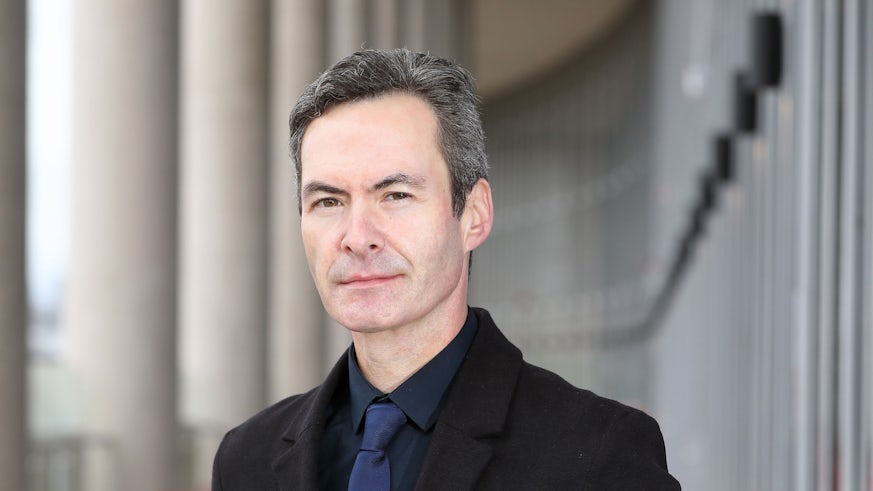“Running crept up on me”
10 March 2022

Later this month, thousands of runners will take part in the Cardiff University/Cardiff Half Marathon.
It’s a flat, fast 13.1 mile route taking in some of the capital’s iconic landmarks including Cardiff Castle, the Norwegian Church and the Principality Stadium.
This year, joining the race will be the University’s Deputy Vice-Chancellor, Professor Damian Walford Davies.
Running as part of #TeamCardiff, Professor Walford Davies is one of 350 staff, students alumni and friends who are aiming to raise £70,000 for Cardiff University’s neuroscience and mental health research, and cancer research.
Here, Professor Walford Davies writes about discovering running during the COVID-19 pandemic and the impact exercise has had on his mental and physical wellbeing.
---------------------------------------------------------------------------------
I never was or thought of myself as a runner. I found it difficult, lacklustre, tame.
Never a fan of rugby or football, I was into racket sports, relishing the 1:1 focus – a tennis or squash ball doing what my hand and eye told it to do, to within an inch of its line.
Then work intervened, breeding a false assumption that I simply didn’t have the time anymore.
The first lockdown – the weather, early on, ironically beautiful – proved a turning point. Do you remember? For a good year I’d been staring at a road bike I’d bought long since – a Specialized Allez (nothing special) – feeling guilty that its tyres were as pristine as on the day I’d bought it. I was writing a book about Gino Bartali, the great Italian cyclist of the 1930s and 1940s, and guilt and my admiration for Gino got me out into the strange space of lockdown exercise (once a day). Cycling from Cardiff out into the Vale as April turned into May and high summer became not a diversion from multiple stresses and challenges but a need, a compulsion, a hunger – a necessary component of my mental as well as physical health. Then winter came and proved me to be a fair-weather cyclist.
What could I do to satisfy the need that could now not be exorcised, to exercise, to be out there moving through space, observing things, and observing things change? I still dreaded running. The first few paltry circuits of a local route, run in absolutely – embarrassingly – inadequate shoes, were as bad as expected. I never was or thought of myself as a runner (I’d repeat, like a mantra). Until – as with so many things – you turn around to find that you’ve been running every day for a long time. Running crept up on me. Then the investment in a decent pair of shoes and suddenly finding – again, out of nowhere, mid-run, passing a sycamore tree and a medieval church (details are important) – that I was running on the tips of my toes with a forefoot strike: something I’d never understood to be even possible, much less fast and comfortable. Much less me.
Running five laps of a small circuit – now out in a village in the Vale – became running 5K, then 10K, then 20K – the enjoyment remaining, enhanced by the paradoxes of what one experiences and learns when running: a detachedness and a connection with those observed; calmness and euphoria; a sense of the deep ordinariness of everything and a spiritual uplift; a honed awareness of the world’s detail and a zoning out into a running universe that is both in and not of time.
Getting ready for a run in the dark every evening after a day at the screen became a ceremony to which one could look forward: donning the gear, the headphones channelling a recently updated playlist (I can’t run except with sound – which must be dance, rock or indie music, never podcasts, which never propel me forward), a running light strapped across the chest and shoulders, white before and red behind.
It’s the small things that stick in the mind and are conjured when, in the middle of daylong meetings, I think about the night’s release into running: how the torch beam illuminates the rainfall; how primroses suddenly just appear on the verge when there was no hint of them last night; how your fellow villagers observe time-bound activities so that you pass them in exactly the same spot on the circuit; how running over the small footpath across the village stream seems utterly momentous; and how lucky I am that I am able to do this, knowing that there will come a time when I will not be able to. And being superstitious, I have little rituals at specific sites during the run: the glance thrown at a window, always lit, high up in the Great House; the tree whose summer shade or winter-latticed canopy I always slow down under; the two large stones in the wall outside the house whose smooth, mother-of-pearl surfaces I always touch before starting out. Thus, to be right, each run must be a rite. My runs are cyclical, grand returns: the very definition of the uncanny – something both intimately known and utterly unfamiliar.
I am now out in all weathers, feeling guilty, once again, about the bike. It is locked up outside, waiting for me – unbelievably, a runner – to fall in love with it all over again.
Damian Walford Davies
----------------------------------------------------------------------
The Cardiff University/Cardiff Half Marathon takes place on Sunday 27 March 2022.
